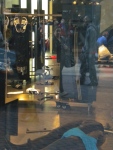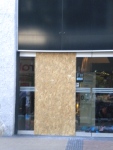Birmingham Riots
Unfortunately, it doesn’t seem worthwhile talking about anything else when British society seems to be crumbling at the foundations. The riots in London and Birmingham (and latterly in Bristol, Nottingham, and Liverpool) have gripped public consciousness in a way that makes discussing sociolinguistics a rather unimportant endeavour. And since I live in Birmingham, recent events have hit quite close to home which has made me question the direction in which we as a society seem to be going.
The first thing to say is that the riots in Birmingham do not, to me at least, appear to be motivated in the same way as the Tottenham riots. In Tottenham, the shooting of Mark Duggan (it’s unclear at the moment how far he appeared to have posed a direct threat to the safety of the police) and the subsequent police reaction to family enquiries as to the circumstances under which he shot, appear to have generated a critical mass of public discontent.
In Birmingham, by contrast, there was no clear catalyst as to why the violence erupted in the way it did. Instead, this seems to be a ‘copy-cat’ case of violence, looting and theft on a scale unseen since the mid-80s. Much of the commentary has focused on the fact that it is young men who have been at the centre of the riots and that their motivations are purely selfish and mindless, but I would say that this focuses only on the symptoms of a deeper issue within British society.
It’s no coincidence that the riots are being led primarily by young black males (in Birmingham at least), many of whom will likely be unemployed, or if they are working, on minimal wage. With the divide between the rich and the poor getting wider and wider, with cuts attacking some of the only services which aim to help and support young people, and with Governmental policy seemingly ignoring the plight of the urban poor, it’s little wonder that the riots haven’t happened earlier. If we reject out of hand that these riots are motivated by anything else other than ‘mindless thuggery’, we ignore the fact that there are deeper reasons as to why we find ourselves where we do. Disaffected, disconnected from society, marginalised and stigmatised due to their age, sex and ethnicity, young black men find themselves in an untenable position. If they keep quiet about their place in society, nothing changes. If they speak up, no-one listens. If they riot, it’s ‘mindless thuggery’. While it’s likely that those involved in the riots are not politically motivated to do so, that does not mean their involvement is not a political statement.
If more time, money and effort was invested in the livelihoods of youths in the UK today, then maybe young men who could potentially be involved in the riots would stand back and question whether it was worthwhile. It’s schemes like Arrival Education and the Prince’s Trust which show an alternative path for young men to walk on, it’s schemes like this which need to be protected and secured for current and future generations, and it’s schemes like this that the Government is cutting under the guise of ‘cost saving’ (unsurprisingly, the events which are unfolding were predicted by the head of the National Children’s Bureau as far back as October).
This isn’t to legitimate what has transpired over the last 24 hours in Birmingham, since destruction of property, theft and assault should in no way be condoned, whatever the circumstances, but we cannot bury our heads in the sand and put these riots down to some criminal youth element that doesn’t need explaining. Instead, we should be looking towards solutions which go beyond the criminal justice system, water cannons and rubber bullets. Such ‘strategies’ might quell the disorder in the short-term, but it’s an ineffective way of dealing with public disorder in the long-term. Giving young men a reason to be part of a community, part of society and feel like a useful and wanted member of the public can only be for the good of our cities and our future. Ignoring this is not only dangerous, but foolhardy in the extreme.
Addendum
Went into town today to pick a few things up and survey the damage. Clean up teams did a great job dealing with the majority of the damage, but here are some pics of a few shops which got hit. Also just want to note this guy who managed to put a more-or-less live blog together about the riots, covering both last night and tonight. As much as social media is apparently facilitating the movement of the rioters, it’s good to see it being put to more productive uses as well.
– The Social Linguist







Thanks for writing this.
It’s incredible, as we were tweeting about the other night, the impetus behind this is complex, and while it’s easy to either blame the rioters or the police depending on our moods, ultimately this is the result of a society bearing down on a vulnerable population and that population reacting to it. This kind of violence doesn’t help the young and disaffected, but it does give them a voice, for better or for worse. It would just be such a shame if the result of this was for people to say ‘fuck the rioters’ or ‘fuck the police’ or ‘fuck the government’ rather than ‘why have we as a people let things get this way?’
Keep up the writing, you’re doing great.
p.s. I hope the rioting doesn’t get too bad by you tonight.
Hey Aaron, thanks for the comment and I couldn’t agree with you more. As I said, while this might not be explicitly politically motivated (cf. the student riots), it’s absolutely a political statement which we can’t ignore. We need to try and figure out a sustainable way of addressing the fundamental social malaise which is at the heart of these events if there is any hope of preventing situations like this erupting in the future. Heavy-handed police tactics, scare mongering and ‘tough talk’ is akin to putting a plaster on a patient who is bleeding out in A&E. We need to get to the root of the problems here, not address the symptoms.
I’m currently out of the country, hanging out with friends of the family and I had an interesting conversation with them this evening that weaved its way around some of these topics. One thing that was brought up was that in Knokke, the town we’re in, there’s very little diversity socially, economically or culturally and that this has led to a situation where crime is nearly unheard of. The very next statement, which came from a woman who seems liberal and multiple times stated she wanted to remain open-minded was that the only time there had been crime was when a group of Moroccans had been in town, and once they were arrested then there was no more trouble. To be honest I was at a bit of a loss as to how I should respond to that. But that seemed to encapsulate how those who aren’t directly affected by the politics of poverty have a hard time empathizing with those who are.
I find it quite difficult to speak about these things because the discussion can never remain dispassionate, people are strongly opinionated and its hard to convince them that my strongly held beliefs are more righteous than theirs. But I guess it’s good to at least try to have these conversations, even if it’s just amongst ourselves.